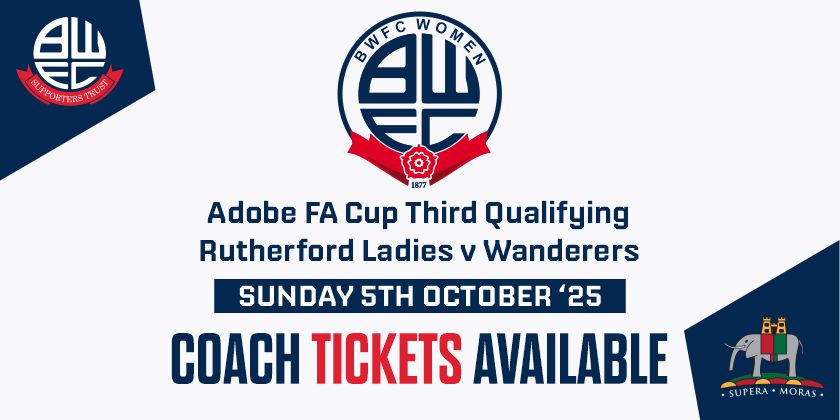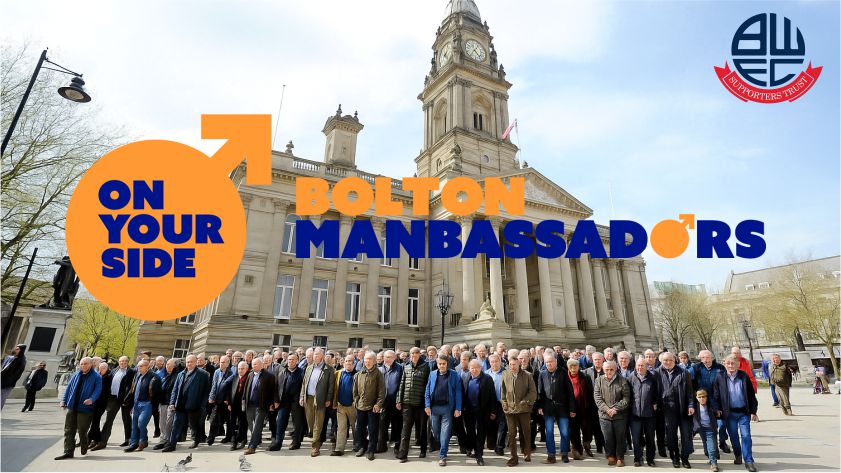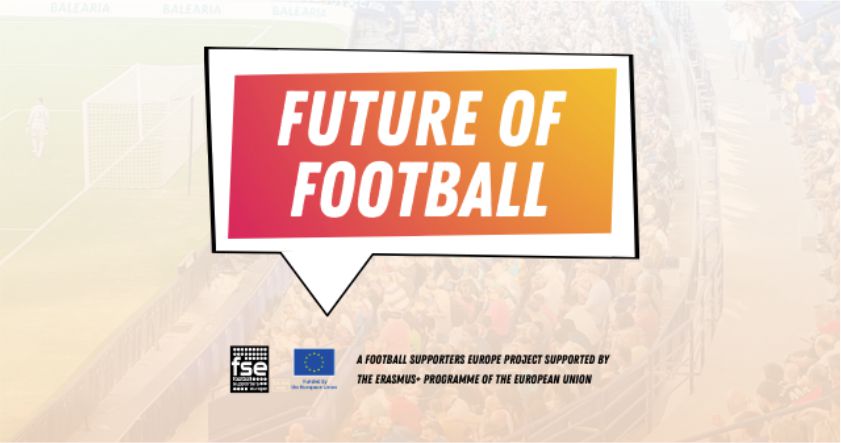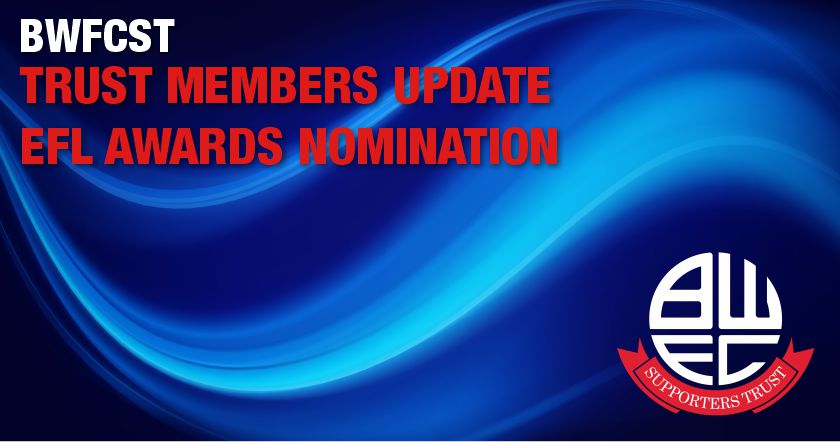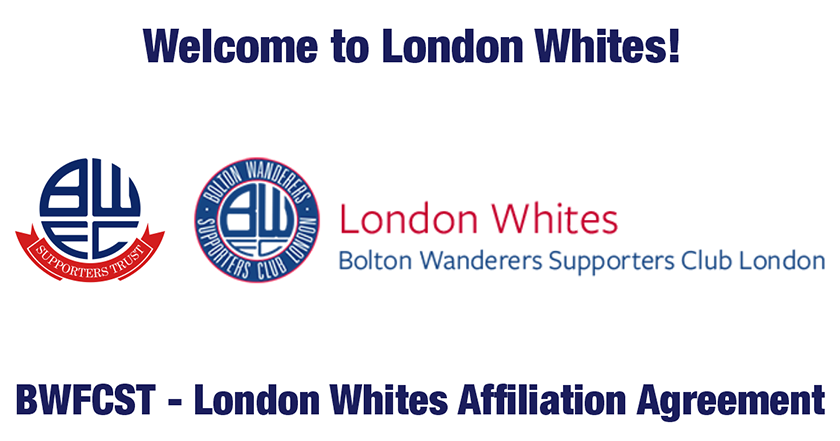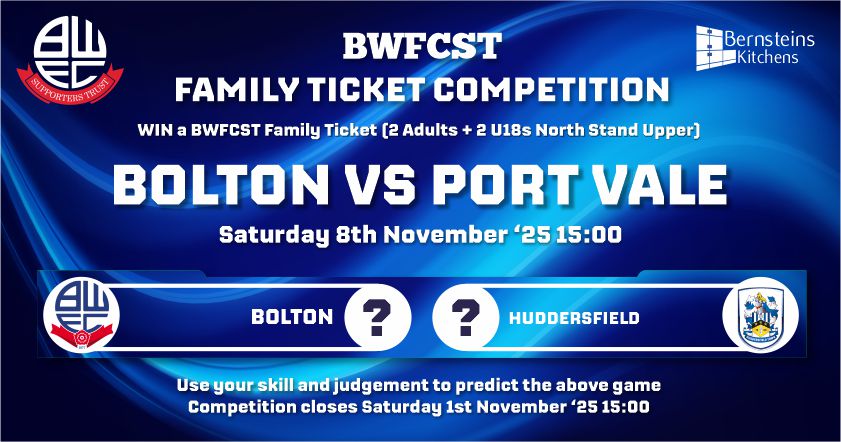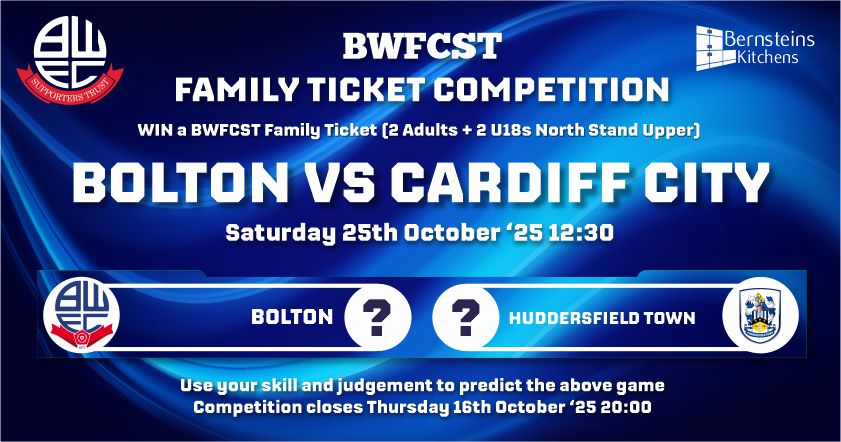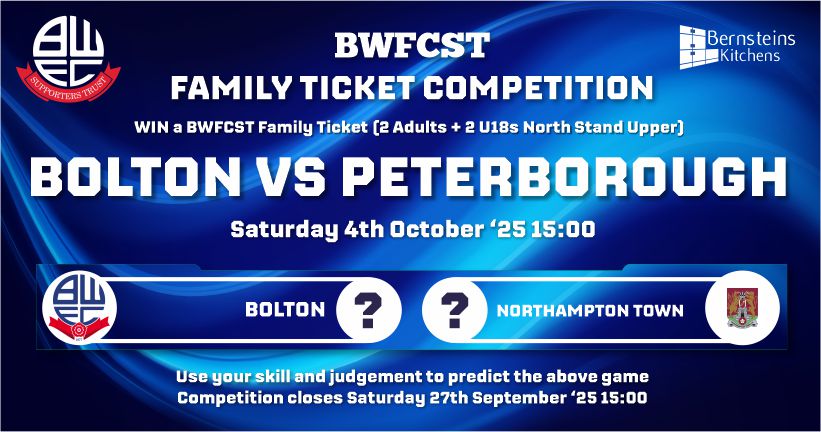ASK BWFCST A QUESTION CLICK HERE
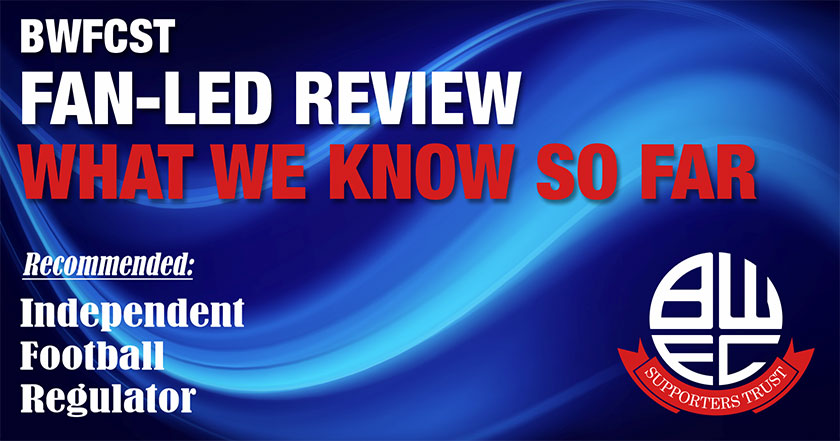
Fan-Led Review - What We Know So Far
- BWFCST Admin
- General Trust News
The current stance of the BWFCST is to support the recommendations of the Fan-Led Review (FLR) in full and to continue discussions with BWFC as part of our structured dialogue process as to how both club and trust can work together in addressing all aspects of the review, with focus on the long-term stability and sustainability of our club as the main aim.
Following on from our initial overview posted shortly after the FLR was published on 24 November ’21, we have looked further into the contents of the review and the following is a more detailed overview.
What is the Fan-Led Review?
The independent review was announced by the then Culture Secretary, Oliver Dowden, on 19th April 2021. It is a comprehensive examination of the English football system with the aim of exploring ways of improving the governance, ownership and financial sustainability of clubs in the football pyramid, building on the existing strengths and benefits of our game and addressing the inequalities that undoubtedly exist.
There were three key events that lead to the announcement of the review:
- The collapse of Bury FC
- Covid-19 and its impact on football
- The attempt to set up the European Super League (ESL) in April 2021
From a BWFC point of view, the events taking place during administration between May-Aug 2019 left serious concerns in the minds of BWFC supporters about the motives, intentions and performance of football club owners. Over 2 years on, our club has experienced a relegation, a promotion and, more importantly, no winding up petitions or court actions. There is also a Memorandum of Understanding in place and structured dialogue between the trust and the club is now taking place on a regular basis as can be seen from the meeting notes and Q&A schedule available on the BWFCST website.
Who was consulted and how were fans involved?
The review has been led Tracey Crouch MP and supported by a panel of experts. The panel included representatives of fans including the Chief Executive of Football Supporters’ Association (FSA) and other members from the football community.
Evidence was heard from a wide range of football stakeholders, including both group and one on one sessions involving Tracey Crouch, her panel and the BWFCST. Other groups contributing to the review included:
- Representatives of supporters of more than 130 football clubs
- Football Supporters’ Association
- Kick it Out
- The Football Association (FA)
- The Premier League
- The English Football League (EFL)
- National League
- The Professional Footballers Association
- Football club owners including the ‘Big Six’ and others throughout the pyramid
Evidence sessions were held with experts in finance and other relevant areas including the Beautiful Game, FA Equality Now and Fair Game. An online survey was conducted with over 20,000 responses. Preliminary findings were issued on 22nd July, 2021.
The key findings of the review
- The riches on offer at the top level of the game are leading many clubs with fragile finances to gamble with their sustainability, which was further exposed by Covid-19
- Many clubs are poorly run, with reckless decision making fueled by an illusion of success resulting in a disconnect between the interest of fans and owners
- Current regulation and governance of the game at the domestic level is not up to the task of solving the inherent challenges that exist and specialist business regulation will be needed
What are the Main Recommendations of the Review?
As noted in our initial FLR overview posted on the BWFCST website on 25 November ‘21, there are ten strategic recommendations:
- To ensure the long-term sustainability of football, the Government should create a new independent regulator for English football (IREF)
- To ensure financial sustainability of the professional game, IREF should oversee financial regulation in football.
- New owners’ and directors’ tests for clubs should be established by IREF replacing the three existing tests and ensuring that only good custodians and qualified directors can run these vital assets.
- Football needs a new approach to corporate governance to support a long-term sustainable future of the game.
- Football needs to improve equality, diversity and inclusion in clubs with committed EDI Action Plans regularly assessed by IREF.
- As a uniquely important stakeholder, supporters should be properly consulted by their clubs in taking key decisions by means of a Shadow Board.
- Football clubs are a vital part of their local communities, in recognition of this there should be additional protection for key items of club heritage.
- Fair distributions are vital to the long-term health of football. The Premier League should guarantee its support to the pyramid and make additional, proportionate contributions to further support football.
- Women’s football should be treated with parity and given its own dedicated review.
- As an urgent matter, the welfare of players exiting the game needs to be better protected – particularly at a young age.
.
Why is an Independent Regulator so important?
There are several reasons behind the recommendation that an Independent Regulator is needed:
- Conflict between current regulators:
- Premier League require 14 of 20 clubs to approve a rule change.
- EFL require a majority of (72) clubs + a majority of (24) clubs in the Championship.
- Lack of resource – taking too long to resolve issues is a big concern.
- Missed opportunities and a lack of action for reform (DCMS inquiry into Bury FC in 2019 achieved nothing).
- Lack of one voice – as evidenced by Covid-19 leading to further uncertainty.
- Lack of accountable leadership – the sub-standard regulatory system has overlaps and gaps, with varying levels of oversight including the Premier League, EFL, National League, and The FA, all with different agendas.
The Review concluded that:
- The men’s game is at the financial cliff-edge.
- Corporate governance in clubs is poor in many instances.
- Short-term interests of owners and the long-term interests of fans are not always consistent.
- The current system of regulation is not fit for purpose as it is slow to act, there are conflicts of interest, and there is a lack of clear regulatory leadership and transparency.
- Fans have lost faith in the football authorities.
Four options were considered:
- Leave it to the market forces and allow poorly run clubs to collapse when they are no longer able to cope financially.
- Allow a football-led solution to develop with a continuation of the current system self-regulation.
- Co-regulation with a requirement for all stakeholders to work together.
- Independent Regulation.
After looking at best practice in other important industries the review concluded an Independent Regulator would be the best option as:
- It would focus on the long-term interests of fans, clubs and the wider game
- It would be more adaptable and flexible, and be free to respond and act more quickly when required
- It provides a holistic solution, avoiding gaps and duplication, whilst taking a wider view of the game
- It will provide focus in a complex area with an ability to recruit the relevant skills and experience
What is an Independent Regulator for English Football (IREF)?
An independent regulator is planned to be established in statute via the Parliamentary process with the purpose of ensuring operations and decision making are independent from government and political interference. IREF will operate with a clear remit and duties will include:
- Assess, report and act on the subject of finances in football, and on distributions and financial flows in the game
- Have regard to English football’s position as the premier global location of domestic football
- Undertake its work in a timely manner
- Ensure equality, diversity and inclusion is a key part of the set-up and governance of clubs
- Initial focus will be on financial sustainability requirements.
- Regulation will be delivered through a licensing system applicable to the Premier League, EFL and National
League (Step 5).
- The club will be the license holder, but senior leadership arrangements and structures will also be an important consideration.
- IREF will create license conditions which will need to be flexible to respond to future changes.
- IREF will have powers relating to regulations and license requirements, including information requests, with interim powers for suspected breaches.
- Statutory timetable will be established for investigations and sanctions will be agreed.
- IREF will have its own board and a chair (independent of clubs) appointed by a panel of experts. It will have its own staff who will have an understanding of the football industry, and also the range of professional services required to fulfil its role.
- The IREF Board will be accountable for its actions, decisions and how it operates. It will be accountable to Government and required to prepare an annual report setting out its operational and financial performance.
- IREF will be sustainably funded by license fees on a sliding scale based on broadcasting revenue and each club in the same league will pay the same fee. It is understood that government will fund initial set-up costs for a shadow IREF.
- Shadow regulation will be introduced when the legislation receives Royal Assent.
What role will supporters’ trusts play in the future as a result of the review?
Supporter engagement is a key aspect of the review, and the proposal is that this will be achieved through the licensing rules.
The Review considered several options:
- Fans’ forum
- Structured dialogue
- Fan-elected director
- Supporter advisory/shadow board
- Supporter shareholders
A mandated Shadow Board is recommended by the review with the following conditions:
- Written Terms of Reference based on a standard IREF template allowing local flexibility
- Consist of 5-12 members appointed under a democratic process.
- Appoint a chair from its members on a seasonal basis.
- Have reserved seats for representatives from key supporter groups including representatives of the body holding the Golden Share, equality, diversity and inclusion representatives, youth supporters and international supporters.
- Members should be subject to retirement by rotation – ensuring turnover and experience on the Shadow Board.
- Hold at least quarterly meetings with club executives, with guaranteed attendance from the club CEO or equivalent twice per year.
Issues for the Shadow Board:
- The club’s strategic vision and objectives.
- Short, medium and long-term business plans.
- Operational matchday issues of concern to supporters.
- Any proposals relating to club heritage items.
- Marketing, merchandising, and sponsorship plans and performance – strategy not specific contracts etc.
- Stadium issues and plans.
- The club’s plans for broader supporter engagement.
In addition, Shadow Boards should:
- Receive suitably redacted club board papers ahead of meetings.
- Be seen as a minimum level of consultation.
- Be solely focused on business (not playing) matters.
What is a “Golden Share”?
There is a recommendation that it should be a license condition that all licensed clubs should include within their Articles of Association a Golden Share requiring democratic consent to proposed actions relating to identified heritage items. Each Golden Share right should have circumstances in which it will not apply.
Characteristics of Golden Share:
- No financial value or capable of being transferred or otherwise disposed of other than to than to an alternative supporters’ body meeting the required criteria.
- It does not convey ownership rights nor rights to attend an AGM, or rights to vote on any ordinary or special company resolution.
- The rights of the Golden Share cannot be varied without the written consent of the owner of the share and the Independent Regulator.
Issues linked to Golden Share:
- Sale of club stadium
- Re-location of the club outside of the local area
- The club joining a new competition that is not affiliated to FIFA, UEFA, and the FA
- Club badge
- First Team home shirt club colours
- Club Name
Who holds the Golden Share?
A Community Benefit Society (CBS) formed under the Cooperative and Community Benefit Societies Act 2014. A CBS has:
- To be formally constituted and incorporated and have a legal identity.
- To have community benefit written into its governing documents and must conduct business for the benefit of its local community.
- To operate on a democratic one-member-one-vote basis.
- To not distribute profits among its members.
- To be subject to regulation by FCA.
- To be an asset locked organisation.
Bolton Wanderers Supporters’ Society Ltd (BWFCST) qualifies as such a body.
What happens next?
The Review recommendations require legislative approval which will take 6-9 months. In the meanwhile, there is ongoing dialogue in the media. Whilst the EFL has shown initial support for the proposals there is opposition from the Premier League and The FA.
Where can I read more?
The Fan-Led Review of Football Governance: securing the game’s future is available at:
https://www.gov.uk/government/publications/fan-led-review-of-football-governance-securing-the-games-future
The BWFCST will continue to play an active part as the next phase of the fan-led review unfolds, with the best interests of our club and the supporters always to the fore and will keep members updated with future developments.
If you are not already a BWFCST member, you can join today by clicking here.
BWFCST
07 December 2021



